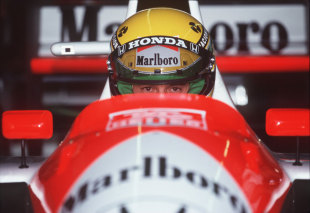- What the papers said - Ayrton Senna, 20 years on
'The grand prix hero of Hollywood's dreams'

- Drivers:
- Ayrton Senna
Thursday's sports pages have unsurprisingly been full of tributes to Ayrton Senna to mark the 20th anniversary of his death at the San Marino Grand Prix.
"His manner was understated," writes Simon Barnes in the Times. "He had the knack of becoming the still point of his own turbulent world. He was quiet, almost stately in manner, but he was always possessed by unquiet ambitions. There was something rather unearthly about him.
"His ambition was never a matter of mere victory. He set his sights far higher than that. Formula One drivers are a rarified breed, but among them there has never been an individual quite so far from the common run as Senna."
Barnes also explains how Senna told him on an occasion how he kept trying to find his limit behind the wheel, only to find he could actually go further.
"Motor racing is a sport and is therefore a business that has its basis in frivolity," Barnes concludes. "But Senna was not chasing anything as frivolous as glory. He was in pursuit of something that nobody else even knew was there."
In the Mirror, the duty of remembering that fateful day falls to Ollie Holt, who was motor racing correspondent for the Times in 1994, as he talks about his return to Formula One's "Dealey Plaza", Imola.
"I remember the gasps in the press room when Ayrton Senna's car hit the wall at Tamburello on May 1, 1994," Holt writes. "I remember the agitated chatter of the radio commentators and staring at the TV monitors showing what was happening a few hundred yards away.
"I remember seeing Senna's head nod forward in the cockpit and thinking he was OK. I remember the medics arriving, the blood staining the gravel and the white screens going up around Senna's Williams-Renault. I remember my friend Stan Piecha, who was not usually a man prone to solemnity, saying: 'I think he's gone.'"
In the Guardian Richard Williams writes: "Senna had everything it would take to create the grand prix hero of Hollywood's dreams. But something else, something more mysterious, captivated not just the fans who continue to revere his memory but later generations of drivers to whom he represents a permanent reference point."
"Twenty years later, and in a more scientific age, Ayrton Senna - a romantic, gladiatorial, complex virtuoso - still sets the standard."
In an equally wonderful piece in the Telegraph, Oliver Brown returns to Hotel Castello, where Senna stayed that weekend, as the hotel owner, Damon Hill and Martin Brundle recount how Senna felt in the wake of Roland Ratzenberger's crash.
"Emotionally, Senna felt incapable of racing," writes Brown. "But pragmatically speaking, he had to."
"By the time pre-race anxiety gripped the Williams garage, Senna conveyed a more agitated air than usual. He withdrew from the chatter of the mechanics, scrutinising the car with suspicion and leaning pensively against the rear wing. There was such sombreness about him, according to his former PR chief Betise Assumpção, that 'you could just tell he didn't want to race'".
Ian Parkes, writing in the Independent, talks of the "demigod" status Senna enjoyed in Brazil, but also of the remarkable importance he placed on faith.
"Part of Senna's mystique was his devotion and connection to God, his religious beliefs, his quest to seek answers in the Bible, which many of a secular persuasion could not understand," writes Parkes. "One of Senna's oft-repeated quotes is the line 'If you have God on your side, everything becomes clear'".

